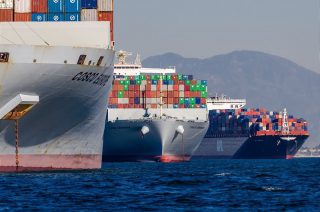BCG: Mergers and Acquisitions Are Future of Container Shipping

Rather than joining an alliance, container liners should use a blend of global mergers and smaller merger and acquisition (M&A) deals that can help reduce costs, consulting firm Boston Consulting Group (BCG) said.
Beyond the increase in scale that a merger brings, it can also unlock synergies, which will prove critical, according to BCG.
Companies should “harvest synergies by being savvier in their deployment of their fleet and network coverage,” the consulting group said.
Carriers are also advised to reassess their terminal and intermodal contracts and adjust their commercial networks in view of new market dynamics.
However, to capture the full potential of synergies from M&A deals, companies are advised to move quickly to a common IT infrastructure and shared processes.
Even companies that have not engaged in M&A deals will have to unlock more synergies from their alliances, according to the consulting firm.
“Carriers have been shy about going after the full benefits alliances offer, such as cost savings from joint procurement or joint operations. Today, with a low bunker cost, the slot-cost advantage of ultralarge vessels is weaker than it was in times of super-high bunker costs. Additionally, alliances that comprise many players are complex, especially in terms of operations, and they generate a degree of rigidity that can hinder optimization of networks and operations,” BCG said.
To attain further benefits from alliances, members could explore the possibilities afforded by forging joint procurement and joint operations, pooling equipment such as container boxes, and combining shared-service centers in critical regions, according to BCG.
Alliance models with better integration of operations and assets are needed, BCG said, adding that conventional alliances and vessel-sharing agreements are no longer enough.
Companies would also need to challenge the setup of their network of services and optimize their fleet deployment.
Companies can use digital technologies to improve the effectiveness and efficiency of their commercial platforms and booking systems. Such technologies would also help them boost the efficiency of internal processes and better manage the fleet. Examples include on-board technology that supports system monitoring and data exchange between ships and shore.
BCG said that the global container-shipping industry is entering a new-normal period characterized by daunting challenges. These include persistent overcapacity, as well as overall sluggish growth in trade volumes stemming from a complex confluence of forces across key trades worldwide.
To succeed in these challenging conditions, each player would need to keep driving change aimed at buttressing its individual performance. It will not be easy to meet these imperatives, but carriers that embrace the effort now stand the best chance of weathering the difficult times to come, BCG concluded.
HEADLINES
- Do shipping markets want Biden or Trump for the win?
- All 18 crew safe after fire on Japanese-owned tanker off Singapore
- Singapore launching $44m co-investment initiative for maritime tech start-ups
- Cosco debuts Global Shipping Industry Chain Cooperation Initiative
- US warns of more shipping sanctions
- China continues seaport consolidation as Dalian offer goes unconditional